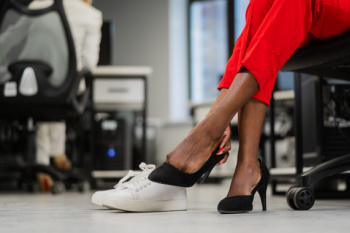
Wearing high heels can be fashionable, but they often come with the price of foot and ankle pain. The design of high heels forces the foot into an unnatural position, placing excessive pressure on the ball of the foot and causing the toes to be cramped together. This can lead to a range of issues, including blisters, calluses, bunions, and hammertoes. The elevated heel also alters the body's alignment, putting additional strain on the ankles, knees, and lower back. High heels can also contribute to developing plantar fasciitis, where the ligament running along the bottom of the foot becomes inflamed and painful. Ankle sprains are more likely due to the instability caused by the narrow heel base. To minimize these risks, it is important to choose high heels with proper support and cushioning, limit the time spent wearing them, and perform regular foot stretches and exercises to maintain flexibility and strength. If you experience foot or ankle pain after wearing high heels, it is suggested that you schedule an appointment with a podiatrist for an exam and treatment.
High heels have a history of causing foot and ankle problems. If you have any concerns about your feet or ankles, contact one of our podiatrists from Princeton Foot & Ankle Associates. Our doctors can provide the care you need to keep you pain-free and on your feet.
Effects of High Heels on the Feet
High heels are popular shoes among women because of their many styles and societal appeal. Despite this, high heels can still cause many health problems if worn too frequently.
Which Parts of My Body Will Be Affected by High Heels?
- Ankle Joints
- Achilles Tendon – May shorten and stiffen with prolonged wear
- Balls of the Feet
- Knees – Heels cause the knees to bend constantly, creating stress on them
- Back – They decrease the spine’s ability to absorb shock, which may lead to back pain. The vertebrae of the lower back may compress.
What Kinds of Foot Problems Can Develop from Wearing High Heels?
- Corns
- Calluses
- Hammertoe
- Bunions
- Morton’s Neuroma
- Plantar Fasciitis
How Can I Still Wear High Heels and Maintain Foot Health?
If you want to wear high heeled shoes, make sure that you are not wearing them every day, as this will help prevent long term physical problems. Try wearing thicker heels as opposed to stilettos to distribute weight more evenly across the feet. Always make sure you are wearing the proper shoes for the right occasion, such as sneakers for exercising. If you walk to work, try carrying your heels with you and changing into them once you arrive at work. Adding inserts to your heels can help cushion your feet and absorb shock. Full foot inserts or metatarsal pads are available.
If you have any questions please feel free to contact one of our offices located in Princeton and West Windsor, NJ . We offer the newest diagnostic and treatment technologies for all your foot and ankle needs.
